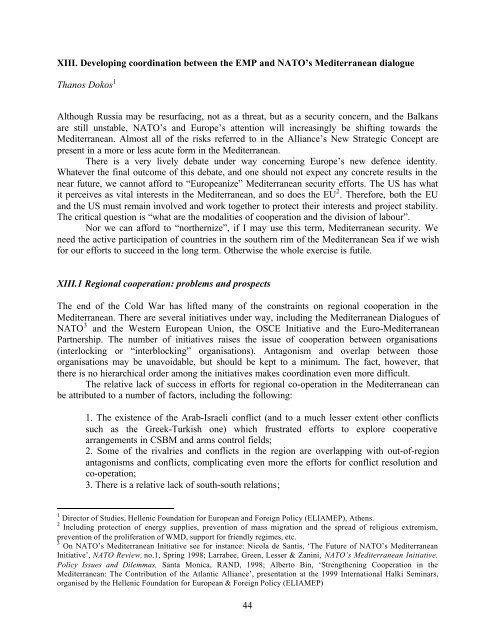The future of the Euro-Mediterannean security dialogue
The future of the Euro-Mediterannean security dialogue
The future of the Euro-Mediterannean security dialogue
You also want an ePaper? Increase the reach of your titles
YUMPU automatically turns print PDFs into web optimized ePapers that Google loves.
XIII. Developing coordination between <strong>the</strong> EMP and NATO’s Mediterranean <strong>dialogue</strong><br />
Thanos Dokos 1<br />
Although Russia may be resurfacing, not as a threat, but as a <strong>security</strong> concern, and <strong>the</strong> Balkans<br />
are still unstable, NATO’s and <strong>Euro</strong>pe’s attention will increasingly be shifting towards <strong>the</strong><br />
Mediterranean. Almost all <strong>of</strong> <strong>the</strong> risks referred to in <strong>the</strong> Alliance’s New Strategic Concept are<br />
present in a more or less acute form in <strong>the</strong> Mediterranean.<br />
<strong>The</strong>re is a very lively debate under way concerning <strong>Euro</strong>pe’s new defence identity.<br />
Whatever <strong>the</strong> final outcome <strong>of</strong> this debate, and one should not expect any concrete results in <strong>the</strong><br />
near <strong>future</strong>, we cannot afford to “<strong>Euro</strong>peanize” Mediterranean <strong>security</strong> efforts. <strong>The</strong> US has what<br />
it perceives as vital interests in <strong>the</strong> Mediterranean, and so does <strong>the</strong> EU 2 . <strong>The</strong>refore, both <strong>the</strong> EU<br />
and <strong>the</strong> US must remain involved and work toge<strong>the</strong>r to protect <strong>the</strong>ir interests and project stability.<br />
<strong>The</strong> critical question is “what are <strong>the</strong> modalities <strong>of</strong> cooperation and <strong>the</strong> division <strong>of</strong> labour”.<br />
Nor we can afford to “nor<strong>the</strong>rnize”, if I may use this term, Mediterranean <strong>security</strong>. We<br />
need <strong>the</strong> active participation <strong>of</strong> countries in <strong>the</strong> sou<strong>the</strong>rn rim <strong>of</strong> <strong>the</strong> Mediterranean Sea if we wish<br />
for our efforts to succeed in <strong>the</strong> long term. O<strong>the</strong>rwise <strong>the</strong> whole exercise is futile.<br />
XIII.1 Regional cooperation: problems and prospects<br />
<strong>The</strong> end <strong>of</strong> <strong>the</strong> Cold War has lifted many <strong>of</strong> <strong>the</strong> constraints on regional cooperation in <strong>the</strong><br />
Mediterranean. <strong>The</strong>re are several initiatives under way, including <strong>the</strong> Mediterranean Dialogues <strong>of</strong><br />
NATO 3 and <strong>the</strong> Western <strong>Euro</strong>pean Union, <strong>the</strong> OSCE Initiative and <strong>the</strong> <strong>Euro</strong>-Mediterranean<br />
Partnership. <strong>The</strong> number <strong>of</strong> initiatives raises <strong>the</strong> issue <strong>of</strong> cooperation between organisations<br />
(interlocking or “interblocking” organisations). Antagonism and overlap between those<br />
organisations may be unavoidable, but should be kept to a minimum. <strong>The</strong> fact, however, that<br />
<strong>the</strong>re is no hierarchical order among <strong>the</strong> initiatives makes coordination even more difficult.<br />
<strong>The</strong> relative lack <strong>of</strong> success in efforts for regional co-operation in <strong>the</strong> Mediterranean can<br />
be attributed to a number <strong>of</strong> factors, including <strong>the</strong> following:<br />
1. <strong>The</strong> existence <strong>of</strong> <strong>the</strong> Arab-Israeli conflict (and to a much lesser extent o<strong>the</strong>r conflicts<br />
such as <strong>the</strong> Greek-Turkish one) which frustrated efforts to explore cooperative<br />
arrangements in CSBM and arms control fields;<br />
2. Some <strong>of</strong> <strong>the</strong> rivalries and conflicts in <strong>the</strong> region are overlapping with out-<strong>of</strong>-region<br />
antagonisms and conflicts, complicating even more <strong>the</strong> efforts for conflict resolution and<br />
co-operation;<br />
3. <strong>The</strong>re is a relative lack <strong>of</strong> south-south relations;<br />
1 Director <strong>of</strong> Studies, Hellenic Foundation for <strong>Euro</strong>pean and Foreign Policy (ELIAMEP), A<strong>the</strong>ns.<br />
2 Including protection <strong>of</strong> energy supplies, prevention <strong>of</strong> mass migration and <strong>the</strong> spread <strong>of</strong> religious extremism,<br />
prevention <strong>of</strong> <strong>the</strong> proliferation <strong>of</strong> WMD, support for friendly regimes, etc.<br />
3 On NATO’s Mediterranean Initiative see for instance: Nicola de Santis, ‘<strong>The</strong> Future <strong>of</strong> NATO’s Mediterranean<br />
Initiative’, NATO Review, no.1, Spring 1998; Larrabee, Green, Lesser & Zanini, NATO’s Mediterranean Initiative.<br />
Policy Issues and Dilemmas, Santa Monica, RAND, 1998; Alberto Bin, ‘Streng<strong>the</strong>ning Cooperation in <strong>the</strong><br />
Mediterranean: <strong>The</strong> Contribution <strong>of</strong> <strong>the</strong> Atlantic Alliance’, presentation at <strong>the</strong> 1999 International Halki Seminars,<br />
organised by <strong>the</strong> Hellenic Foundation for <strong>Euro</strong>pean & Foreign Policy (ELIAMEP)<br />
44
















